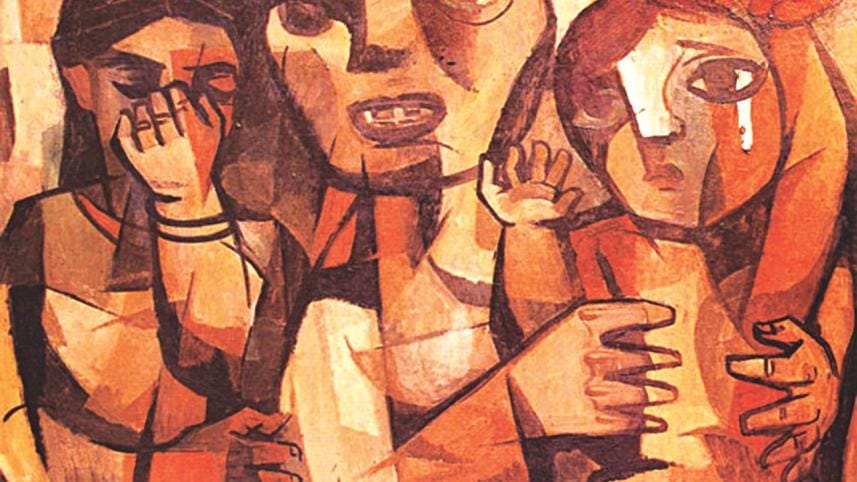Saner views from Pakistan

Readers may have read an introspective piece on 19th September under the caption 'The hanging of Mir Quasem Ali'. It was indeed refreshing to come across an honest and largely historically correct observation of a Pakistani about the genesis of Bangladesh and particularly about the recent trial of Bangladeshi war criminals and collaborators of 1971. The Pakistani, in question, is Mr. Pervez Hoodbhoy, an educator and no wonder he has been able to take a dispassionate view of men, matter, and moments.
It is undeniable that a distorted version of history that purposely ignores the atrocities committed by the Pakistan Army in 1971 and the continued obstinacy of the Pakistan establishment in not admitting the horrendous mistakes of that period will only serve to create ill feelings in Bangladesh. Doctored textbooks on the happenings of 1971 in the then East Pakistan will further aggravate the process. Sadly, the myopia of Pakistan is disturbingly explicit when even now one sees that the country is "deeply saddened" by the execution in Bangladesh of Mir Quasem Ali. This war criminal was sentenced to death after what Pakistan describes as "a flawed judicial process."
While optimists would hope that in the coming days discerning Pakistanis will come to terms with the realities, it is pertinent to remind that hanging aging war criminals is not intended to draw satisfaction but actually giving the devil its due. The frail looking characters waiting in the docks with drooping posture must not make us forget the gory crimes they committed in full public view in complete disregard of morals and scruples. Their actions turned countless women into widows and scores of children into orphans.
Believers, including Pakistanis, should know full well that patriotism is an inseparable part of faith. That being so, persons accused of crimes against humanity in 1971 have quite manifestly defied and defiled their own faith. They deserve no compassion and consideration, morally or legally.
The fact of the matter is that in 1971, Bangalees, despite clinching an electoral majority were not only denied their due, they also became the unfortunate victims of a regime-sponsored genocide whose gory details and dimensions are yet to be ferreted out.
The recently published book Blood Telegrams, that tells of a forgotten genocide and the Spivac Communications before and after Bangladesh's cruel birth, brings tragically to the fore the monstrous deeds committed by the Pakistan army and its Jamaat collaborators against hapless Bangalees in 1971. Leaving aside this credible evidence, one could talk to scores of living men and women of Bangladesh who are first-hand witnesses to the horrendous criminality of the Jamaat hirelings against their own countrymen in 1971.
It is, in fact, only a small fraction of the above perpetrators that have been accounted for and are now being charged for crimes against humanity. Let us be very clear on one point; after March 25, 1971, no self-respecting Bangalee could support the Pakistan establishment's action in the then East Pakistan. The Pakistan army was in fact quite unabashedly carrying out what in later days was termed as ethnic cleansing. The racist rage of the 'Brown Sahibs' against the dark skinned Bangalees, despite following the same religion, was manifest. Unspeakable and dastardly crimes were committed in the name of the so-called 'Islamisation drive.'
Let us remember that the tracking of Nazi war criminals has been an unrelenting process. Armenians have not forgotten the extermination campaign against their existence in the early 20th century. Koreans still resent the brutalities committed by the Imperial Japanese Army during WWII. Bangladeshis, despite being subjected to a horrendous genocide, have been more than magnanimous towards their tormentors. So, let the Pakistan establishment atone for its crimes in 1971, as has been done by the Germans.
It is also worth pondering that only a tiny fraction of those guilty of crimes against humanity in 1971 have been indicted. This is partly because the victors had no stomach for the scale of executions, numbering several thousands, which would have been necessary had strict justice been enforced against every criminal accused of crimes against humanity. Very few retributive executions took place in liberated Bangladesh. Students of history may like to compare this with events of post-World War II in Europe, where nearly a thousand retributive executions took place in the western zones of occupation. Some 920 Japanese were executed, more than three hundred of them by the Dutch, for crimes committed in the East Indies.
Finally, if indeed Bangladeshis are the brotherly people as has often been claimed by the Pakistani authorities then let them respond accordingly and give the brother the due respect. Let them not defile our sentiments and distort history. We owe at least this much to the countless souls who sacrificed for our sovereignty. Let Pakistanis honour themselves by paying tributes to our war heroes of 1971, especially those brave soldiers of East Bengal Regiment who in large measure gallantly defended Lahore in the 1965 war.
The writer is a columnist of The Daily Star.

 For all latest news, follow The Daily Star's Google News channel.
For all latest news, follow The Daily Star's Google News channel.
Comments